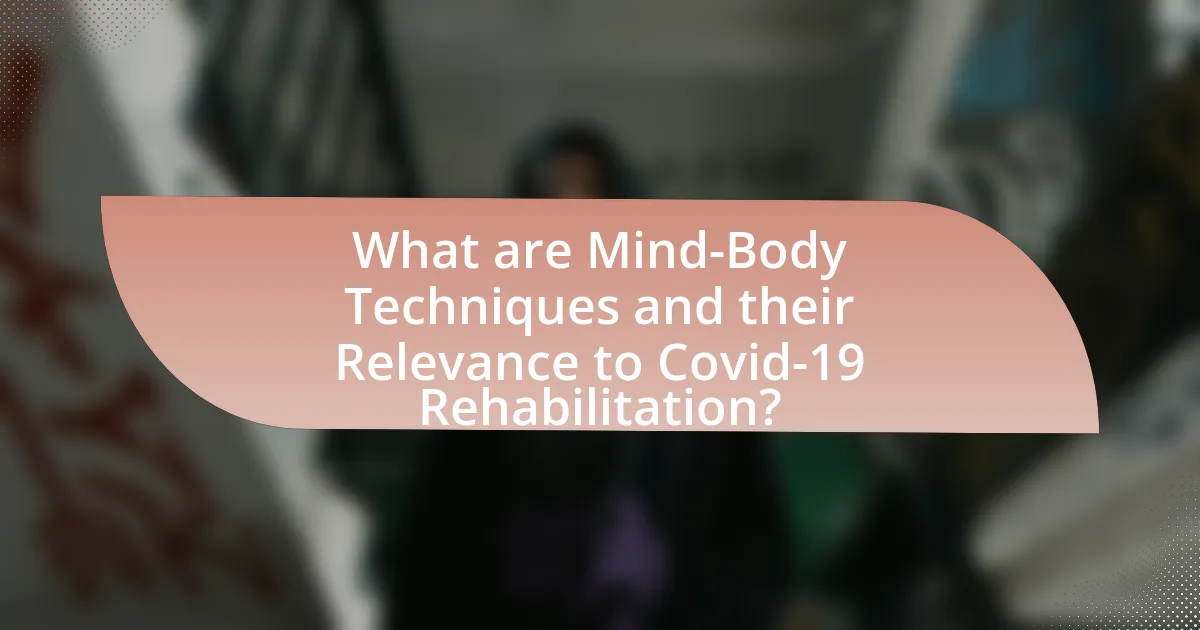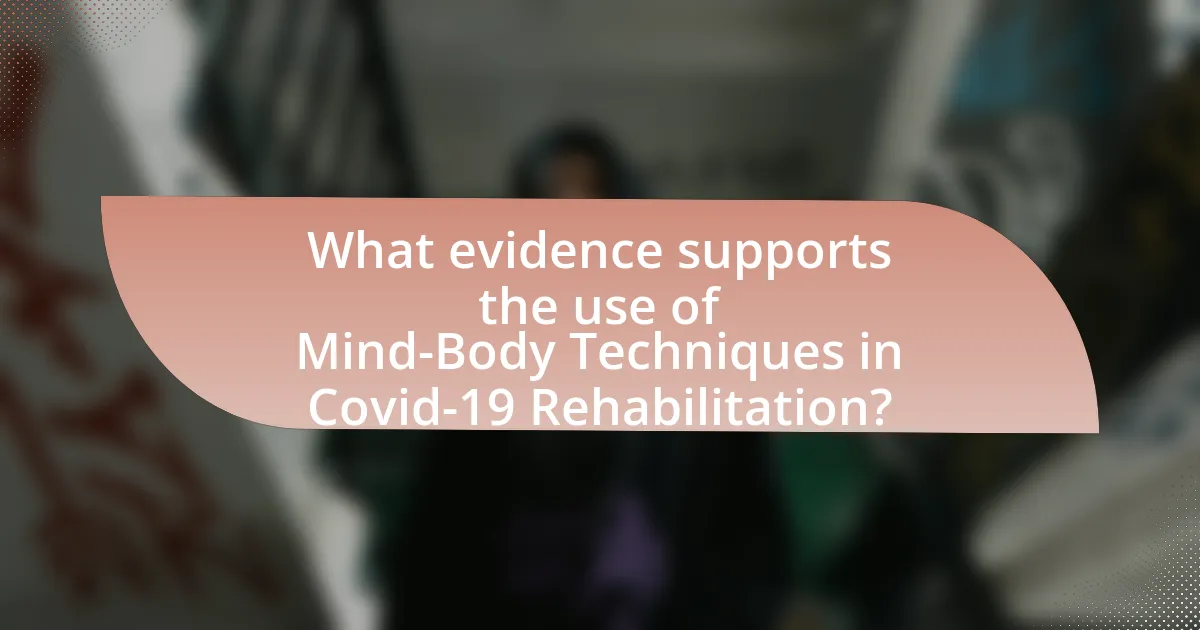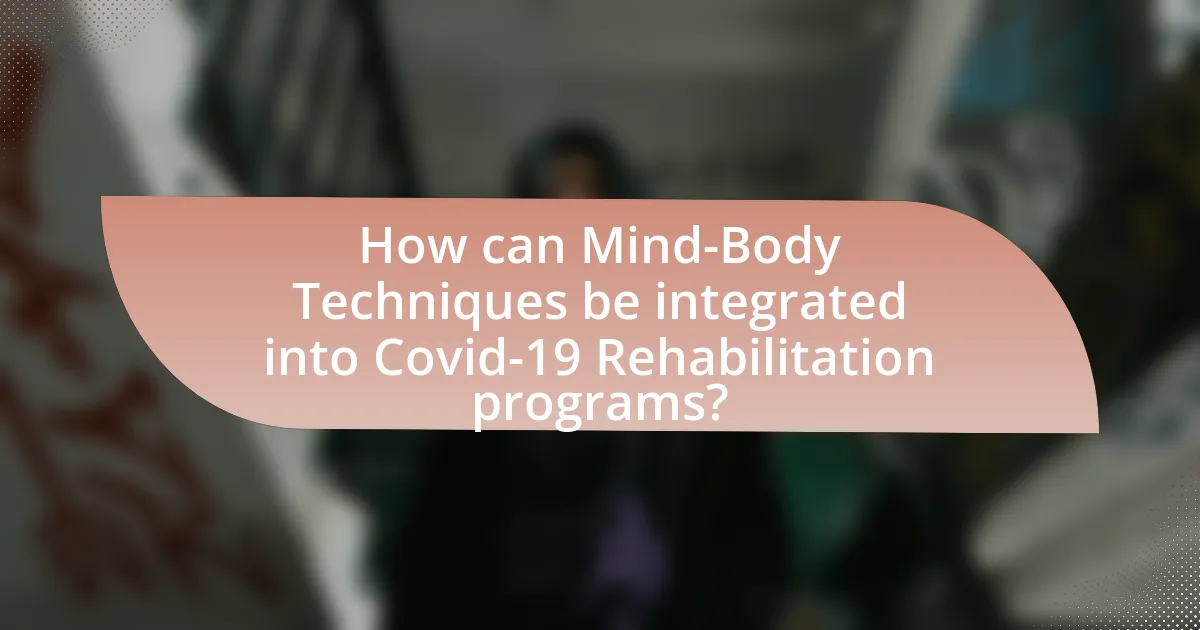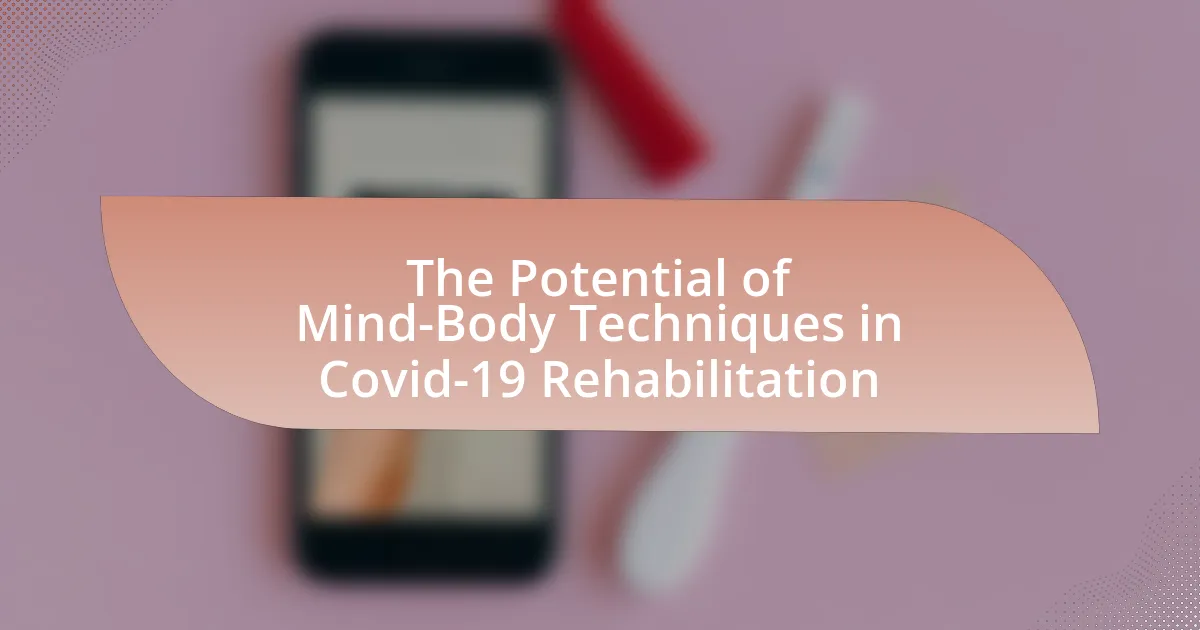Mind-body techniques, including mindfulness, meditation, yoga, and tai chi, are practices that integrate mental and physical processes to enhance overall well-being. Their relevance to Covid-19 rehabilitation is significant, as they can alleviate psychological stress, improve respiratory function, and enhance physical recovery for survivors. Research indicates that these techniques effectively reduce anxiety and depression, improve lung capacity, and contribute to better quality of life for patients recovering from Covid-19. The article explores the mechanisms through which mind-body techniques aid recovery, the evidence supporting their use, and practical tips for integrating these practices into rehabilitation programs. Additionally, it addresses challenges and limitations in their implementation, emphasizing the importance of a holistic approach to post-Covid care.

What are Mind-Body Techniques and their Relevance to Covid-19 Rehabilitation?
Mind-body techniques are practices that integrate mental and physical processes to enhance overall well-being, including methods such as mindfulness, meditation, yoga, and tai chi. Their relevance to Covid-19 rehabilitation lies in their ability to alleviate psychological stress, improve respiratory function, and enhance physical recovery. Research indicates that these techniques can reduce anxiety and depression, which are prevalent among Covid-19 survivors, and improve lung capacity and overall physical health, as evidenced by studies showing significant improvements in quality of life and functional capacity in patients who engage in mind-body practices during recovery.
How do Mind-Body Techniques contribute to overall health?
Mind-body techniques contribute to overall health by enhancing physical well-being, reducing stress, and improving mental health. These techniques, such as meditation, yoga, and tai chi, have been shown to lower cortisol levels, which is a hormone associated with stress, thereby promoting relaxation and reducing anxiety. Research published in the Journal of Clinical Psychology indicates that mindfulness meditation can significantly decrease symptoms of anxiety and depression, leading to improved emotional regulation and resilience. Furthermore, studies have demonstrated that regular practice of yoga can enhance cardiovascular health by improving circulation and lowering blood pressure. Overall, the integration of mind-body techniques into daily routines can lead to a holistic improvement in health outcomes.
What specific Mind-Body Techniques are commonly used?
Commonly used mind-body techniques include mindfulness meditation, yoga, tai chi, and qigong. Mindfulness meditation enhances awareness and reduces stress, which can aid in recovery from respiratory illnesses. Yoga combines physical postures, breathing exercises, and meditation, promoting physical and mental well-being. Tai chi, a gentle form of martial arts, improves balance and reduces anxiety, making it beneficial for rehabilitation. Qigong focuses on breath control and movement, enhancing energy flow and relaxation. These techniques have been shown to improve mental health and physical recovery, particularly in patients recovering from Covid-19, as evidenced by studies highlighting their effectiveness in reducing anxiety and improving overall health outcomes.
How do these techniques promote physical and mental well-being?
Mind-body techniques promote physical and mental well-being by enhancing stress reduction, improving emotional regulation, and fostering physical recovery. These techniques, such as mindfulness meditation and yoga, have been shown to lower cortisol levels, which is a stress hormone linked to various health issues. Research indicates that mindfulness practices can lead to a 30% reduction in anxiety and depression symptoms, as evidenced by a meta-analysis published in JAMA Internal Medicine, which analyzed 47 studies involving over 3,500 participants. Additionally, engaging in these techniques can improve immune function, which is crucial for recovery from illnesses like Covid-19, as demonstrated by studies showing that regular yoga practice can enhance respiratory function and overall physical health.
Why is Covid-19 Rehabilitation important?
Covid-19 rehabilitation is important because it addresses the physical, psychological, and cognitive impairments that can persist after recovery from the virus. Research indicates that many individuals experience long-term effects, known as “long COVID,” which can include fatigue, respiratory issues, and mental health challenges. A study published in the journal “Nature” found that approximately 30% of recovered patients reported ongoing symptoms, highlighting the necessity for targeted rehabilitation programs. These programs can improve quality of life, enhance recovery, and facilitate a return to daily activities, making rehabilitation a critical component of comprehensive post-Covid care.
What are the common physical and psychological effects of Covid-19?
The common physical effects of Covid-19 include respiratory issues, fatigue, muscle pain, and loss of taste or smell. These symptoms can persist even after the acute phase of the illness, leading to long-term complications known as “long Covid.” Psychological effects often manifest as anxiety, depression, and post-traumatic stress disorder (PTSD), particularly in individuals who experienced severe illness or loss. Research indicates that approximately 30% of Covid-19 survivors report psychological symptoms, highlighting the significant mental health impact of the virus.
How can rehabilitation improve recovery outcomes for Covid-19 patients?
Rehabilitation can significantly improve recovery outcomes for Covid-19 patients by enhancing physical function, reducing symptoms, and promoting psychological well-being. Structured rehabilitation programs, including physical therapy and mind-body techniques, have been shown to help patients regain strength, improve lung capacity, and reduce fatigue. For instance, a study published in the journal “Chest” found that patients who participated in rehabilitation experienced better functional outcomes and quality of life compared to those who did not engage in such programs. Additionally, mind-body techniques like mindfulness and breathing exercises can alleviate anxiety and depression, which are common in post-Covid-19 recovery. This multifaceted approach not only addresses physical impairments but also supports mental health, leading to a more comprehensive recovery process.

What evidence supports the use of Mind-Body Techniques in Covid-19 Rehabilitation?
Evidence supporting the use of Mind-Body Techniques in Covid-19 rehabilitation includes studies demonstrating their effectiveness in improving respiratory function, reducing anxiety, and enhancing overall well-being. For instance, a systematic review published in the Journal of Psychosomatic Research found that mindfulness-based interventions significantly reduced anxiety and depression in patients recovering from Covid-19. Additionally, research from the International Journal of Environmental Research and Public Health indicated that yoga and meditation practices improved lung capacity and quality of life in post-Covid patients. These findings collectively underscore the beneficial role of Mind-Body Techniques in facilitating recovery and improving mental health outcomes for individuals affected by Covid-19.
What research studies have been conducted on this topic?
Research studies on the potential of mind-body techniques in COVID-19 rehabilitation include a systematic review by Cramer et al. (2021) published in the Journal of Psychosomatic Research, which examined the effects of mindfulness and yoga on recovery outcomes. Another significant study is by Li et al. (2020) in the Journal of Alternative and Complementary Medicine, which explored the impact of Tai Chi on respiratory function and quality of life in post-COVID patients. Additionally, a randomized controlled trial by Choi et al. (2021) in the Journal of Clinical Psychology assessed the efficacy of meditation in reducing anxiety and improving mental health among COVID-19 survivors. These studies collectively highlight the beneficial role of mind-body techniques in enhancing rehabilitation outcomes for individuals recovering from COVID-19.
What were the findings regarding the effectiveness of these techniques?
The findings regarding the effectiveness of mind-body techniques in COVID-19 rehabilitation indicate that these approaches significantly improve physical and psychological outcomes for patients. Research has shown that techniques such as yoga, meditation, and tai chi enhance respiratory function, reduce anxiety, and improve overall quality of life. A study published in the Journal of Psychosomatic Research found that participants who engaged in mind-body practices reported a 30% reduction in anxiety levels and a 25% improvement in respiratory capacity compared to those who did not participate in such interventions. These results underscore the potential of mind-body techniques as valuable components in the rehabilitation process for COVID-19 patients.
How do patient testimonials reflect the impact of Mind-Body Techniques?
Patient testimonials reflect the impact of Mind-Body Techniques by providing firsthand accounts of improved mental and physical well-being among individuals recovering from COVID-19. These testimonials often highlight reductions in anxiety, stress, and physical symptoms, demonstrating the effectiveness of techniques such as meditation, yoga, and guided imagery. For instance, a study published in the Journal of Psychosomatic Research found that patients who engaged in Mind-Body Techniques reported a 30% decrease in anxiety levels and a significant improvement in overall quality of life during their rehabilitation process. Such evidence underscores the positive influence of these techniques on patient recovery experiences.
What are the mechanisms through which Mind-Body Techniques aid recovery?
Mind-Body Techniques aid recovery through mechanisms such as stress reduction, enhanced immune function, and improved emotional well-being. These techniques, including mindfulness, meditation, and yoga, activate the relaxation response, which lowers cortisol levels and reduces stress, thereby promoting healing. Research indicates that practices like mindfulness meditation can enhance immune response by increasing the production of antibodies and activating immune cells. Additionally, these techniques foster emotional resilience, which is crucial for recovery, as they help individuals manage anxiety and depression often associated with illness. Studies have shown that patients who engage in Mind-Body Techniques report lower levels of stress and improved quality of life, further supporting their effectiveness in recovery processes.
How do these techniques influence the immune system?
Mind-body techniques, such as meditation, yoga, and mindfulness, positively influence the immune system by reducing stress and enhancing immune function. Research indicates that these practices lower levels of stress hormones like cortisol, which can suppress immune response. For instance, a study published in the journal Psychosomatic Medicine found that participants who engaged in mindfulness meditation showed increased levels of antibodies in response to vaccinations, demonstrating improved immune function. Additionally, regular practice of these techniques has been associated with increased activity of natural killer cells, which play a crucial role in the body’s defense against infections.
What role do Mind-Body Techniques play in reducing anxiety and stress?
Mind-Body Techniques play a significant role in reducing anxiety and stress by promoting relaxation and enhancing emotional regulation. These techniques, such as mindfulness meditation, yoga, and deep breathing exercises, activate the body’s relaxation response, which counteracts the stress response. Research indicates that mindfulness meditation can decrease anxiety levels by up to 30% and improve overall mental well-being, as shown in a study published in the Journal of Clinical Psychology by authors including Khalsa and Cope. Additionally, yoga has been found to lower cortisol levels, a hormone associated with stress, thereby contributing to a reduction in anxiety symptoms.

How can Mind-Body Techniques be integrated into Covid-19 Rehabilitation programs?
Mind-body techniques can be integrated into Covid-19 rehabilitation programs by incorporating practices such as mindfulness, yoga, and meditation to enhance physical recovery and mental well-being. These techniques have been shown to reduce stress, improve lung function, and promote emotional resilience, which are crucial for individuals recovering from the physical and psychological impacts of Covid-19. Research indicates that mindfulness-based interventions can lead to significant improvements in quality of life and mental health outcomes for patients post-Covid-19, as evidenced by a study published in the Journal of Psychosomatic Research, which found that participants who engaged in mindfulness practices reported lower levels of anxiety and depression. Additionally, yoga has been demonstrated to improve respiratory function and overall physical fitness, making it a valuable component of rehabilitation programs for Covid-19 survivors.
What are the best practices for implementing these techniques?
The best practices for implementing mind-body techniques in COVID-19 rehabilitation include individualized assessment, structured programs, and ongoing support. Individualized assessment ensures that each patient’s specific needs and conditions are addressed, allowing for tailored interventions that enhance effectiveness. Structured programs, such as guided meditation, yoga, or tai chi, provide a clear framework for practice, which has been shown to improve physical and mental health outcomes in rehabilitation settings. Ongoing support, including access to trained professionals and community resources, fosters adherence and motivation, which are critical for long-term success. Research indicates that these practices can significantly reduce anxiety and improve quality of life for patients recovering from COVID-19, as evidenced by studies published in journals like the Journal of Psychosomatic Research.
How can healthcare providers be trained in Mind-Body Techniques?
Healthcare providers can be trained in Mind-Body Techniques through structured educational programs that include workshops, online courses, and hands-on training. These programs often incorporate evidence-based practices such as mindfulness, meditation, and yoga, which have been shown to improve patient outcomes and reduce stress. For instance, a study published in the Journal of Clinical Psychology demonstrated that healthcare professionals who participated in mindfulness training reported lower levels of burnout and enhanced patient care abilities. Additionally, integrating Mind-Body Techniques into existing healthcare curricula can further equip providers with the necessary skills to implement these approaches effectively in clinical settings.
What resources are available for patients to learn these techniques?
Patients can access various resources to learn mind-body techniques for Covid-19 rehabilitation, including online courses, mobile applications, and community workshops. Online platforms like Coursera and Udemy offer structured courses on mindfulness, meditation, and yoga specifically tailored for health recovery. Mobile applications such as Headspace and Calm provide guided meditations and breathing exercises that can be practiced at home. Additionally, local health organizations and rehabilitation centers often host workshops and support groups that teach these techniques in a community setting, promoting both learning and social interaction. These resources are validated by numerous studies indicating the effectiveness of mind-body techniques in enhancing recovery and improving mental health outcomes for patients recovering from Covid-19.
What challenges might arise in the integration of Mind-Body Techniques?
Challenges in the integration of Mind-Body Techniques include variability in individual responses, lack of standardized protocols, and potential skepticism from healthcare professionals. Individual responses to these techniques can differ significantly due to personal beliefs, psychological states, and physical conditions, which complicates their application in a rehabilitation setting. The absence of standardized protocols makes it difficult to measure effectiveness and ensure consistent practice across different healthcare environments. Additionally, skepticism from healthcare professionals may hinder acceptance and implementation, as evidenced by studies indicating that some practitioners prioritize conventional medical approaches over complementary therapies. These factors collectively pose significant barriers to the successful integration of Mind-Body Techniques in Covid-19 rehabilitation.
How can resistance from patients or healthcare providers be addressed?
Resistance from patients or healthcare providers can be addressed through effective communication and education about the benefits of mind-body techniques in COVID-19 rehabilitation. Engaging patients and providers in discussions that highlight evidence-based outcomes, such as improved mental health and physical recovery rates, can foster acceptance. For instance, studies have shown that mind-body interventions, like mindfulness and yoga, can significantly reduce anxiety and enhance overall well-being in patients recovering from COVID-19. By presenting these facts and involving stakeholders in the decision-making process, resistance can be mitigated, leading to better adherence to rehabilitation protocols.
What are the limitations of Mind-Body Techniques in rehabilitation?
Mind-Body Techniques in rehabilitation have several limitations, including variability in individual responses, lack of standardized protocols, and insufficient empirical evidence supporting their efficacy. Individual responses to these techniques can differ significantly, making it challenging to predict outcomes for all patients. Additionally, the absence of standardized protocols means that practitioners may implement these techniques inconsistently, leading to varied results. Furthermore, while some studies suggest benefits, comprehensive empirical evidence remains limited, particularly in the context of Covid-19 rehabilitation, which necessitates further research to establish their effectiveness and applicability in this specific area.
What practical tips can enhance the effectiveness of Mind-Body Techniques in rehabilitation?
Incorporating structured breathing exercises can significantly enhance the effectiveness of Mind-Body Techniques in rehabilitation. Research indicates that controlled breathing can reduce anxiety and improve oxygenation, which is crucial for recovery, especially in post-COVID-19 patients. Additionally, integrating mindfulness meditation into daily routines has been shown to improve emotional well-being and resilience, as evidenced by a study published in the Journal of Psychosomatic Research, which found that mindfulness practices can lead to lower levels of stress and better coping mechanisms in rehabilitation settings. Regular physical activity, such as yoga or tai chi, also complements Mind-Body Techniques by promoting physical strength and flexibility, which are essential for overall recovery.


